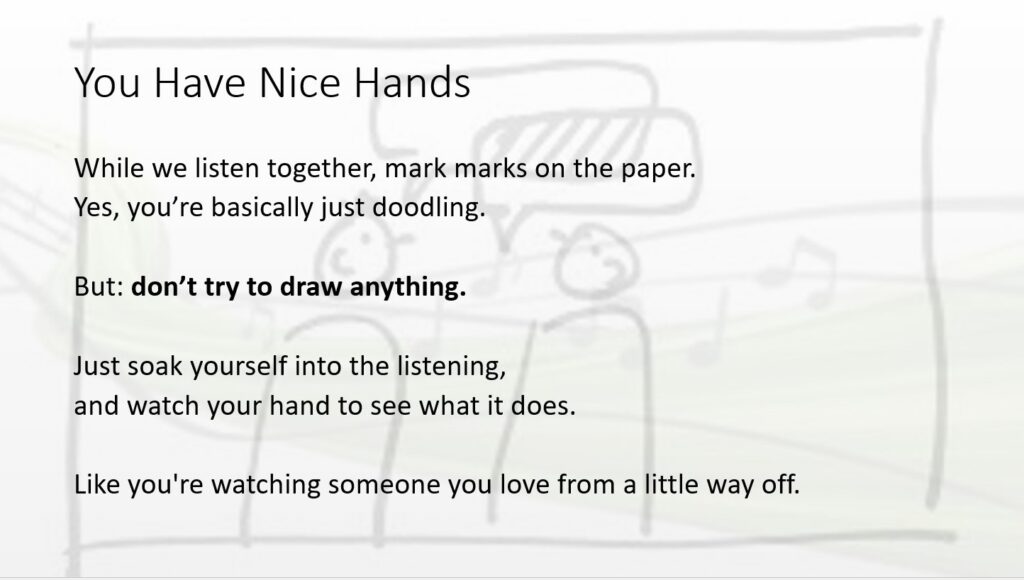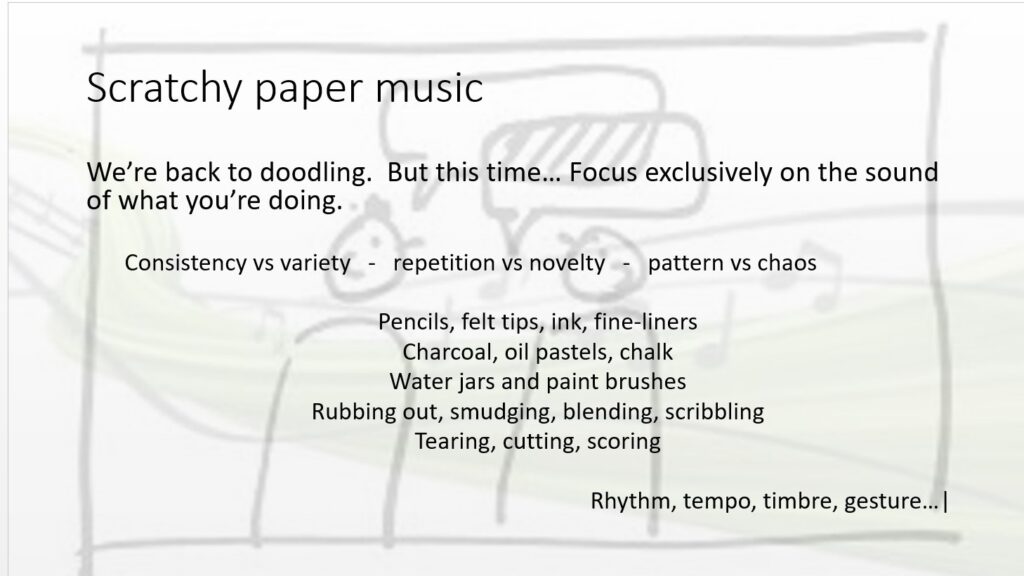 This episode and blog post accompany our May-June ‘Hot Topic’: “Teaching and Learning during a Pandemic: Lessons and reflections from the last year” and our “EUSA Teaching Awards 2021 Podcast Series”.
This episode and blog post accompany our May-June ‘Hot Topic’: “Teaching and Learning during a Pandemic: Lessons and reflections from the last year” and our “EUSA Teaching Awards 2021 Podcast Series”.
In this episode, Rohanie, a Peer Learning Coordinator at Edinburgh University Students’ Association, sits down with Dr. Nikki Moran, a Senior Lecturer in Music at the University of Edinburgh, and two of her students, Tyler and Nicholas, to reflect on their experiences teaching and learning during the pandemic. Tyler and Nicholas attended the Music and Human Communication course, which had Nikki Moran as its Course Organizer. This places the conversation in a fun position, as one might wonder: How does a course on communication look when face-to-face learning is unavailable?

The group begins by discussing a successful aspect of the course: grounding exercises. Defined as any activity that places you further into the present moment, these grounding exercises brought engagement and mindfulness to the virtual classroom. Tyler and Nicholas detail a few from the course, then the conversation expands to a more holistic reflection on online learning, specifically how it has transformed the way we see our homes now that they’re also our workplaces.
I was thinking differently about education and academia. Academia was no longer the lecture hall. It was surrounding myself with things that inspire or interest me, or are part of my personality.
Tyler Tappin, Final Year Student in Edinburgh College of Art
The group’s conversation touches on fascinating questions in response to a year of online learning, including, if we’re no longer going into lecture halls, where is academia? In what ways have our day-to-day schedules changed, and how have we repurposed our time? And maybe most importantly, how will we remember this time, and what will we take with us? We hope you enjoy this thought-provoking conversation and that it encourages you to begin your reflection on this past year of teaching and learning.
Why I Find It Helps To Remember You Have A Bum And A Back
Nikki Moran
The demands of remote teaching have given urgent rise to so many needs during the past 12 months. We need screen breaks, we need good spec tech, we need more space at home than most of us have got, we need our children to go away, we need to move and stretch, and (I think, more than anything), we’ve needed to upgrade the quality and efficiency of our professional relationships, with colleagues and with students.
What I mean by better quality relationships is, the sort of relationships that can really tolerate confusion, and impatience, and misunderstandings, and occasional mute button swearing. We’ve had to share and create new knowledge under exceptionally limiting circumstances and with broken connections, poor sync, terrible sound quality, patchy wifi. Good communication fundamentally requires a basis of some common ground, but when this began we were all in a new place, each of us confined to our own pieces in a square jigsaw of icons and initials and – now and then, if you’re lucky – floating faces.
The digital reduction of our physical selves and our communicative intentions into 2D space is as crummy as it’s miraculous, when we have no alternative way to check that we’ve been heard and understood. It’s far too easy to dissolve into a puddley, formless state of gaze and scroll, gaze and scroll, all our precious connections to other people mindlessly constrained to a loop between gritty eyes, aching ears, fingers on the keyboard… This is why I find it really helps to remember you have a bum and a back, and I have enjoyed reminding my students of this, too.

This semester I have systematically integrated such reminders into my online teaching, making space for the class to act (not think) in a playful and creative manner in response to a variety of prompts, some as warm-up activities, others as core teaching devices. I’ve used my experience of improvisation and mindfulness practices, and it’s been serious fun – as in, the results have induced both laughter and deep reflection. Devising the exercises for online groups required a little bit of thinking, mostly in reshaping group facilitation strategies that I have used informally for a number of years. Making these work online has felt like a game-changer, for the way that they can transform a shallow, disconnected virtual space into an engaged and quite courageous cohort of students.
– Playful grounding exercises as standard welcome/warm-up
– ‘Busy hands’ tasks, to help students navigate online discussions with one another
– Structured peer-to-peer listening sessions, timetabled alongside academic seminars
– Deliberate integration of freeform creative journalling exercises (doodling, painting, colour, collage) into academic topic-based discussions:
- to support students’ development of their own voice and original argument
- to support students’ autonomy, their own approach to integrating knowledge
- to create space for emerging student-led discussion and new perspectives on central issues of concern such as good academic conduct, plagiarism, etc.

Over this time, I’ve loved finding patches of common ground with other ECA colleagues who have also been trying out new strategies. And I’ve loved naming each exercise – Lemon Buzz, Alternative Corner Reality, You Have Nice Hands, Labyrinth, Other Body Curiosity… Please get in touch if you’d like to know more. If you’re already using creative journaling or art techniques in your academic teaching, I would especially like to chat!
Check out Nikki’s interview with EUSA on her Teaching Award nomination.
 Dr Nikki Moran
Dr Nikki Moran
Nikki is a Senior Lecturer in Music, ECA, where she works with students anywhere from undergraduates in their first semester to PhD research students. She is also a contributing author and presenter of the University’s Coursera MOOC, Fundamentals of Music Theory. Since then, she’s developed her thoughts on the role of conventional music literacy in HE and music scholarship, access and opportunity in music education, and critical approaches to scientific and public discourse around music, which connects to her research on musical performance and cognition. This year she’s enjoyed working on an open access music education project, funded by a Student Experience Grant.
 Rohanie Campbell-Thakoordin
Rohanie Campbell-Thakoordin
Rohanie is the Peer Learning Coordinator at Edinburgh University Students’ Association, supporting the development of PALS schemes, the Teaching Awards, and other academic enrichment opportunities for students across the university. Alongside her position, she is a freelance illustrator and graduated from Edinburgh College of Art in 2018. She is particularly interested in widening participation, particularly with People of Colour; writing her undergraduate dissertation on the plight of artists from the Caribbean diaspora in the UK.
 Nicholas Ross
Nicholas Ross
Nicholas Ross is a student preparing to enter his fourth year of study on the MA Hons Music course at the University of Edinburgh. His main areas of study are composition and music theory with a keen interest in music for screen and games. His main instrument of study is the electric guitar, with bass guitar and keyboard as secondary instruments. In his spare time, he plays guitar for the Edinburgh-based progressive rock band Atrium and the Glasgow-based thrash metal act Midir.
 tyler tappin
tyler tappin
Tyler Tappin is a Film and TV student at the Edinburgh College of Art. He is passionate about films, music, and sound design, practices which he hopes to follow a career in after graduating from University.
 Eric Berger
Eric Berger
Eric is a Mathematics and Statistics student at the University of Edinburgh and a podcasting intern for Teaching Matters. Eric is passionate about university student mental health, interviewing researchers for the Student Mental Health Research Network at King’s College London, leading the University of Edinburgh’s WellComm Kings Peer Support Scheme, and conducting research on stigma for People With Mental Illnesses (PWMI). In his free time he enjoys watching and playing sports, over-analysing hip-hop songs, podcasts, and any sort of wholesome shenanigans.

